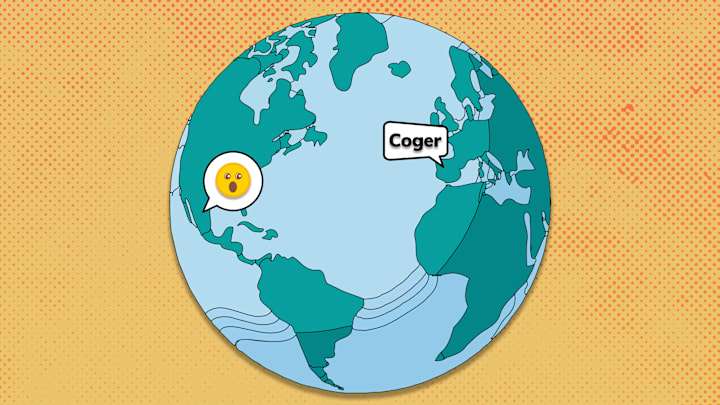Spanish is the fourth most spoken language in the world with around 595 million total speakers. With so many hispanophone countries out there, it’s no surprise that there’s some variation in vocabulary. To make sure you don’t mix up your sandwiches and cakes—or your jackets and masturbation—here’s a list of 12 words that vary between Castilian and Latin American Spanish.
Coger
In Spain, the verb coger means “to take,” whether that’s referring to a mode of transport or something that you physically pick up. In Mexico, Argentina, and Venezuela, however, it has a saucier translation: “to fuck.” So it’s a word you definitely don’t want to confuse!
La chaqueta

Here’s another word that could lead to an awkward misunderstanding. On a cold night in Spain, you might need a chaqueta (“jacket”), but don’t publicly announce that you need one in Mexico—there, it’s slang for masturbation.
Correrse
The verb correrse has a G-rated meaning in much of Latin America (“to move over”), but in Spain, it means “to orgasm.” There are some awkward anecdotes of people innocently asking someone in Spain to make some room for them, only to sound like they’re propositioning them instead.
El tinto

Depending on where you are in the world, you may be surprised by the drink your server brings over when you ask for “el tinto.” In Colombia, it is a cup of black coffee, but in Spain and many areas of Latin America, el tinto means “red wine.” Both a very strong start to your day in very different ways.
El jugo
If your morning drink of choice is juice instead, you would want to order “el jugo” in Latin America. Be careful though, because in Spain, el jugo refers to the liquid that comes out of meat—you wouldn’t want that with your morning pancakes. Order “el zumo” instead.
La torta

If you ask for “la torta” in most of the hispanophone world, you will get a sweet treat in the form of a cake, tart, or flapjack. In Mexico, however, you’d be doubling up on your mains, as la torta is a savory sandwich that includes veggies, eggs, avocado, and meat.
El carro
In Latin America, el carro is a car, but if you tell anyone that you’re traveling by carro in Spain, you might get some funny looks: It refers to either an old-school horse-drawn wagon or a supermarket cart.
El coche
The word for a car in Spain is el coche, but in most of Latin America, the term refers to a baby stroller; in Mexico, it’s also a taxi. For an extra meaning that’s completely rogue and non-transport-related, it also refers to a pig or pork in Central America and Mexico.
La alberca

If it is summertime and you want to cool down with a refreshing dip, you might visit the alberca (“swimming pool”) in Mexico. In Spain, however, you’d be embarking on a very different swimming experience: an alberca is a tank or reservoir.
El saco
The next time you’re doing online shopping in Spanish, be sure to check the pictures carefully: If you try to buy a saco in Spain, you’ll get a large bag, but in Latin America you’ll be purchasing a jacket, and in the Andes, you’ll receive a jumper or cardigan!
El machete
As in English, the word machete in most of the hispanophone world conjures up an image of a long sharp knife, but in Argentina, Bolivia, Colombia, and Nicaragua, it refers to a cheat sheet.
El chucho
Now for a noun that really pulls its weight. El chucho seems to have a different meaning in almost every hispanophone country. Colloquially, it refers to a mongrel or mutt, and in Latin America, it can describe the shakes, a fever, or even a joint. It’s also used for two types of food: a custard-filled doughnut, or, when in the Andes, Central America, and Mexico, a tamale. In the southern part of South America, it’s the word for “jail.” Finally, and perhaps most confusingly, it can also be slang for “sweetheart.” Are you calling your partner “sweetheart,” “mongrel,” or “doughnut”? Only you’ll know!
Read More Articles About Languages From Around the World:
